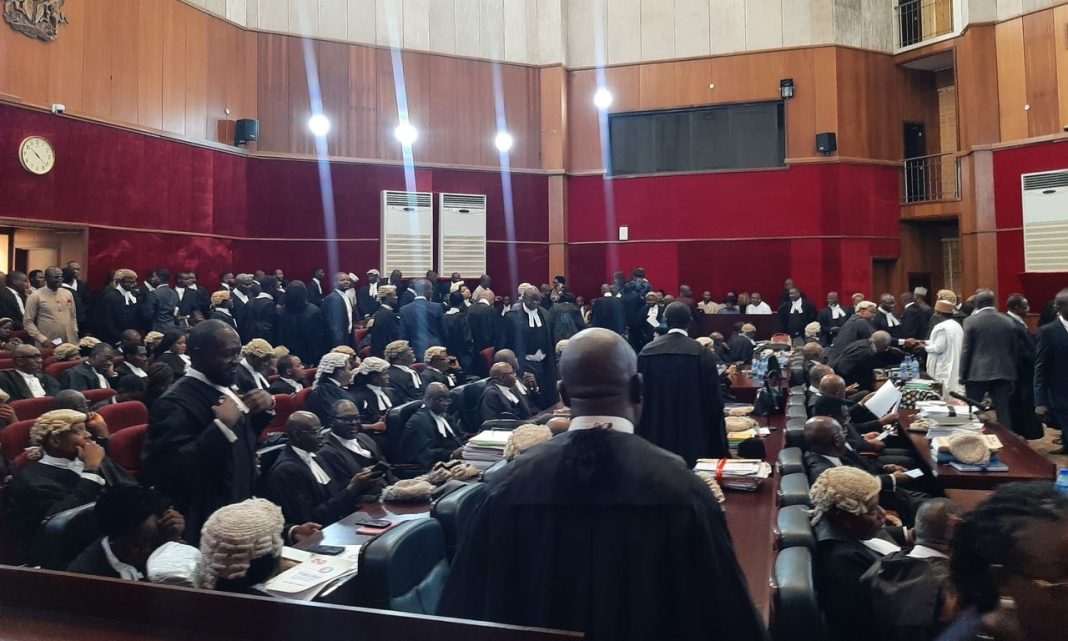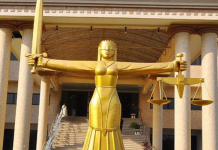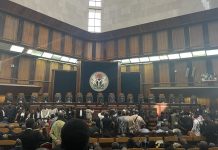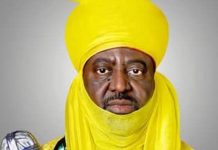The Presidential Election Petition Court (PEPC) has announced its intention to merge the three separate petitions challenging the election of Bola Tinubu of the All Progressives Congress (APC) in the 2023 presidential election.
The three petitions challenging the outcome of the election, which the tribunal intends to merge, are those filed by Labour Party (LP), Peoples Democratic Party (PDP) and Allied Peoples Movement (APM).
In line with Paragraph 50 of the First Schedule to the Electoral Act, the tribunal led by Justice Haruna Tsammani said on Saturday, May 20, that it has the authority to consolidate the petitions and adjudicate on them collectively.
After the tribunal announced the plan Chris Uche, the lead counsel for the Peoples Democratic Party (PDP) presidential candidate, Atiku Abubakar, requested time to consult with the other petitioners before proceeding with the hearing.
“We have examined the matter, but it may require consultation with the other petitioners,” Uche, a Senior Advocate of Nigeria (SAN), said.
“We request a stand down or an adjournment to explore the necessary modalities, as this is akin to a marriage between consenting adults.”
On its part, the Independent National Electoral Commission (INEC) expressed its support for the consolidation of the petitions.
INEC’s lead counsel, Abubakar Mahmood, SAN, said the court has the powers to the merge the suits.
He said INEC will abide by and comply with the court’s decision.
“In my opinion, the provision is mandatory. It clearly states that if there are two or more petitions filed to nullify the same election or return, they must be consolidated, unless the court decides otherwise. We are content with the law’s provision and will abide by the court’s decision,” he said.
Tinubu’s counsel, Roland Otaru, SAN, requested time for consultation.
“My lords, I will need to consult with Chief Wole Olanipekun, SAN, who is the lead counsel in this matter.”
The court thereafter adjourned the proceedings until Monday, May 22, to allow all the parties to report the outcome of their consultations regarding the consolidation of the petitions.
INEC had declared Tinubu as the winner of the February 25 presidential election.
According to INEC, Tinubu secured 8,794,726 votes, the Peoples Democratic Party (PDP) candidate, Atiku Abubakar had 6,984,520, while the Labour Party (PDP) presidential candidate, Peter Obi, polled 6,101,533.
The PDP and LP candidate rejected the result and approached the tribunal with separate petitions to challenge Tinubu’s victory.
They alleged that Tinubu was not qualified to contest the election and that he failed to secure the majority of lawful votes cast at the poll.
They are also contesting that Tinubu’s running mate, Kashim Shettima, had a double nomination contrary to the Electoral Act.
In addition to Atiku and Obi’s petitions, the Allied Peoples Movement (APM) is also asking the court to nullify Tinubu’s election.
The party argued that the withdrawal of Ibrahim Masari as the initially nominated Vice-Presidential candidate of the APC invalidated Tinubu’s candidacy under Section 131(c) and 142 of the 1999 Constitution, as amended.
The party contended that there was a three-week gap between Masari’s expressed intention to withdraw, the actual withdrawal of his nomination, and Tinubu’s replacement of him with Shettima.
The APM further claimed that Tinubu’s nomination had expired when he nominated Shettima as Masari’s replacement.
Although initially five petitions were filed challenging Tinubu’s victory, two of the petitioners, the Action Alliance (AA) and the Action Peoples Party (APP), withdrew their cases during the ongoing pre-hearing sitting of the tribunal.







